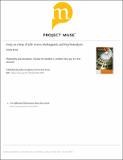Files in this item
Irony as a way of life : Svevo, Kierkegaard and psychoanalysis
Item metadata
| dc.contributor.author | Bond, Emma Frances | |
| dc.date.accessioned | 2017-03-03T16:30:09Z | |
| dc.date.available | 2017-03-03T16:30:09Z | |
| dc.date.issued | 2016-10 | |
| dc.identifier | 239951895 | |
| dc.identifier | 38d210ef-443c-411a-b55e-c080fb59d00d | |
| dc.identifier | 85016225475 | |
| dc.identifier | 000394733000007 | |
| dc.identifier.citation | Bond , E F 2016 , ' Irony as a way of life : Svevo, Kierkegaard and psychoanalysis ' , Philosophy and Literature , vol. 40 , no. 2 , pp. 431-445 . https://doi.org/10.1353/phl.2016.0029 | en |
| dc.identifier.issn | 0190-0013 | |
| dc.identifier.other | ORCID: /0000-0002-0558-4135/work/51261097 | |
| dc.identifier.uri | https://hdl.handle.net/10023/10400 | |
| dc.description.abstract | Dejected by decades of commercial and critical failure, the Triestine author Italo Svevo found fresh inspiration for his final novel (La coscienza di Zeno, 1923) in the writings of Freud. Yet critics have always puzzled over his declared intransigence toward his new master, often attributing this ambivalence to a simple defence mechanism. But what if Svevo had been reading other works simultaneously, works that challenged and exposed the weaknesses of psychoanalytic authority? As this article argues, Svevo’s recently discovered reading of Kierkegaard’s ‘existential irony’ sheds light on his conception of the power of both narrative and the analytical process itself. | |
| dc.format.extent | 297814 | |
| dc.language.iso | eng | |
| dc.relation.ispartof | Philosophy and Literature | en |
| dc.subject | B Philosophy (General) | en |
| dc.subject.lcc | B1 | en |
| dc.title | Irony as a way of life : Svevo, Kierkegaard and psychoanalysis | en |
| dc.type | Journal article | en |
| dc.contributor.institution | University of St Andrews. Italian | en |
| dc.identifier.doi | 10.1353/phl.2016.0029 | |
| dc.description.status | Peer reviewed | en |
This item appears in the following Collection(s)
Items in the St Andrews Research Repository are protected by copyright, with all rights reserved, unless otherwise indicated.

